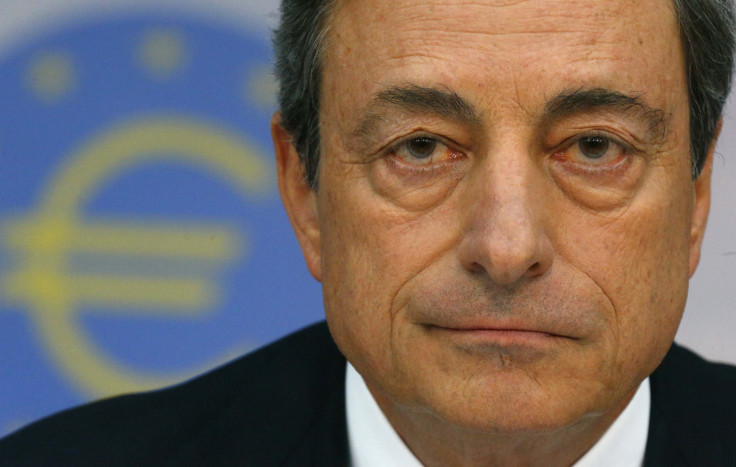ECB Holds Rates While Waiting For Stimulus To Sink In

(Reuters) - The European Central Bank kept interest rates at record lows at it policy meeting on Thursday, waiting to see how stimulus measures laid out over the summer unfold.
Focus now shifts to the after-meeting news conference where market participants seek clues from ECB President Mario Draghi on how close the ECB is to launching more aggressive easing steps, such as quantitative easing (QE) - or printing money to buy large amounts of government bonds.
(Reuters) - The European Central Bank is set to stick to the policy path laid out over the summer when it meets on Thursday, waiting for its stimulus to unfold before considering further steps.
The November policy meeting takes place against a backdrop of meager growth prospects for the euro zone and mounting discomfort among Governing Council members over ECB President Mario Draghi's leadership style.
Reuters reported on Tuesday that national central bankers in the euro area plan to challenge Draghi over what they see as his secretive management style and erratic communication.
But little to no action is expected on further stimulus.
"Recent data has been weak and the pressure on the ECB to add more monetary stimulus has risen further. Yet, we think the ECB is in a 'wait and see' mode now and do not expect new policy measures or major new guidance to be provided," said UBS economist Reinhard Cluse.
To keep the euro zone from slipping into deflation, the ECB has started pumping more money into the banking system through purchases of private debt and offers of long-term loans, aiming to boost its balance sheet by up to 1 trillion euros.
There is growing doubt whether its current measures will be enough, but the ECB is expected to wait until it gets a clearer view of the economy and the impact of its asset purchases and four-year loans to banks before adding further stimulus.
"My sense is that it's not sufficient and that we will see the ECB stepping up and buying corporate bonds," said Moody's chief economist Mark Zandi, pointing to next year.
Draghi's comments during the post-policy meeting news conference will be scrutinized for clues on what may trigger further policy steps. Many economists are looking towards December when the ECB will update its economic projections.
The December macroeconomic projections are produced jointly by experts from the national central banks and the ECB. The Bundesbank, central bank of the bloc's largest economy, conceded in October its own growth forecasts would no longer be met.
ECB staff in September forecast growth of 0.9 percent this year and 1.6 percent in 2015, with inflation reaching 1.4 percent in 2016 - below its medium term target of just under 2 percent. Inflation stood at 0.4 percent in October.
"The ECB will have to slash its staff projections for growth and inflation substantially in December. That will be a strong argument for loosening policy further," said Berenberg chief economist Holger Schmieding.
He pointed to a probability of at least 60 percent that the ECB would step up its stimulus in December, probably by widening its asset purchases to include corporate bonds.
More drastic measures in the form of outright purchases of sovereign bonds - as deployed by other major central banks to boost their economies - still remain distant in the euro zone, mainly due to political hurdles, especially in Germany.
Austrian Governing Council member Ewald Nowotny also struck a cautious tone about buying government bonds, saying the ECB should not be swayed by market pressure and should not be expected to pull a rabbit out of its hat at each policy meeting.
© Copyright IBTimes 2025. All rights reserved.





















